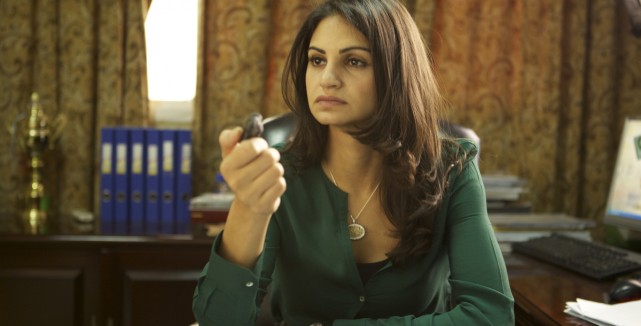WADJDA demands to be noticed (here’s why)
The most striking aspect of “Wadjda” isn’t so much that it’s the first movie filmed entirely in Saudi Arabia, a country bereft of movie theatres, or that it is the product of a female writer and director (Haifaa al-Mansour): it’s that it manages to make the viewer forget these achievements thanks to its elegant plot and the understated, admirable performances of its actors.
Set in a suburb of Riyadh, the film follows ten-year-old Wadjda and her quest to buy a much-coveted bicycle in order to race Abdullah, a friend from the neighborhood. Bike riding, among a host of other activities, is considered inappropriate for girls, but Wadjda is not about to let this dissuade her.
“Wadjda” is an outstanding film, but this is not just because of its plucky heroine (played to perfection by Waad Mohammed). Ms. Mansour has not given us a trite story about a child and a dream; rather, “Wadjda” is, at its heart, a careful examination of the lives of Saudi Arabian women. With the exception of the friendly Abdullah, who helps Wadjda skirt the edges of appropriate behavior, male characters are conspicuously absent from the film, Wadjda’s father and other men flitting in and out of the frame.
The film’s women are not on Wadjda’s side in her quest to make the bicycle her own. Her mother (Reem Abdullah) vacillates between scolding her daughter for acting “like a boy” and trying to keep her husband interested in the family (since his wife cannot have more children and he wants a son, Wadjda’s father is on the lookout for a second wife.) School, under the command of the hypocritical Ms. Hussa, is no better, and it is here that Wadjda subtly chafes against some of the sharpest conventions. Ms. Hussa views the Converse sneaker-wearing Wadjda as something of an irritant, and Wadjda does little to change this opinion until the school’s Koran recitation competition is announced; the prize money will enable her to buy the bicycle. In order to beat the other contestants, Wadjda reinvents herself as a dutiful member of the school’s religious club, winning the admiration of Ms. Hussa and the ire of her classmates.
Wadjda’s innocence, coupled with her willingness to use the constraints of Saudi culture to achieve her own modest goals, is what makes the film so striking. Her ability to push back against the dictates of a society known for its strictness contrasts sharply with the adults who toe the line. Ms. Mansour never lets the viewer forget that Wadjda’s world is one where women cannot drive and items like magazines and nail polish are considered sinful.
Wadjda’s mother, who exercises little control over her own life, epitomizes the challenges of women working and living under such restrictions (Ms. Mansour went up against those restrictions, too: during the shooting of the outdoor scenes, she was apparently forced to direct from inside a van so that she not be seen interacting with men in public.) Although Wadjda’s mother does not initially support her daughter’s desire for the bicycle, the actions of the harsh Ms. Hussa at the end of the film reveal that she is fully in her daughter’s corner.
“Wadjda” was recently submitted as a potential nominee for Best Foreign Language film at the upcoming Academy Awards, and hopefully it will be on the final list of nominees for this honor. It is a triumphant piece of storytelling that reflects the best, most hopeful parts of human nature.
“Wadjda” is Saudi Arabia’s first nominee for a foreign-language Academy Award.
news via inbox
Nulla turp dis cursus. Integer liberos euismod pretium faucibua



